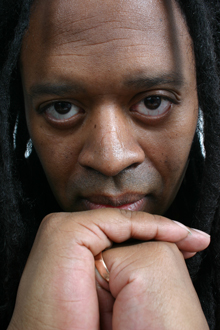Donné Roberts
By wavelength ~ Posted Thursday, May 3rd 2007WL 362 – Sunday, May 6 – 10pm
Purveyor of: jazz with soul and funk with heart
Donné Roberts has been playing guitar since he was a child, joining his first band when he was fifteen. A native to Madagascar who moved to Moscow at the age of seven, Roberts’ emotive playing has drawn comparisons to guitar legends like B.B. King and garnered him a Juno for his first Canadian release, “Rhythm Was Born”. Dan Taylor caught up with Donné over the phone to talk about his music, his touring, and his expectations for the Wavelength show on May sixth.
You’ve moved around a lot, from Madagascar to Russia to France and now to Canada. How have the places you’ve lived in and traveled to impacted your music?
My first move was from Madagascar to Russia when I was seven, which had a huge influence on me. Growing up, I wasn’t really aware that my brothers and sisters were interested in music or playing guitar; we didn’t have much money and there may have been one guitar in our house for my five brothers and one sister. Actually, I don’t even remember for sure if there was a guitar!
When we moved to Russia, it was more financially stable and suddenly there were six guitars in the house! I was the last one to pick it up, and that’s how I learned to play, bugging people to teach me.
Also moving to Russia, I came to appreciate Madagascar music more than I ever would have if I’d stayed there. I missed the culture and the music and traditional instruments, things I never even noticed when I was there.
How does Canada compare to other places you’ve toured?
It’s offered some great opportunities that you might not expect. Recently we got to play with some aboriginal singers, which was a first for me. Last New Year’s I had the opportunity to play for an audience that included Madagascar people, which was my first time doing that since I was 11.
One thing that is often said about your guitar playing is how emotive it is, how you can inject the notes with feeling. This may be a stupid question, like asking Picasso how he paints, but is there a certain headspace you get into when performing? How much does improvising enter into your style?
As a teenager learning to play guitar, like anyone else I tried to imitate great guitar players like Hendrix, Santana, Clapton. I’d learn the songs themselves in a basic way, then learned the details, and eventually learn how they’re doing what they’re doing. Once I could play the song the way they play it, I was able to begin experimenting with my own techniques.
I realized the same phrase or line or even note could be played so many different ways. A note can be pulled or slid a different way, and it changes things drastically, and I’d make a song my own through improvisation and experimentation. With my own songs I play very rhythmically, which is a huge part of the way I play. Both with guitar and vocals, rhythm has a lot to do with how my songs are played
I’m often jealous of musicians because part of their job is traveling around the country and seeing so many places. How does touring rate for why you love your job?
Actually, traveling is the hardest part of my job. Leaving home is always difficult. Not only being away from my loved ones, but all the things you have to worry about with booking shows and the traveling itself and where and when you’re meeting up with people.
Before a tour there’s a lot of anticipation and anxiety, but that only lasts until I get to the airport. Then I meet up with the band and it’s a whole new experience and I’m in the moment, and the anxiety’s gone.
So do you prefer studio work to touring?
I love the pressure of the studio. I’m a perfectionist of course, but I’m only a perfectionist until I have to pay for it! In the studio you’re always aware of the clock.
You also have to think about other factors, it’s not just you and the studio. “Rhythm was Born” was recorded in a day and a half in May of 2005. We didn’t have much money, so it had to be done fast and even then we were limited by when we could make the record. Musicians were going away on tours, so I had to organize them and figure out when people were available. There was also the CBC lockout, so we had to take that into consideration for promotion. There was pressure from so many outside influences that had nothing to do with the music.
Luckily it all came together because I’m fortunate to work with great musicians and a great producer. It was all pretty much first take for all the songs.
What are you focusing on right now?
Mostly writing for a new album that we’re recording next winter, and this summer we’re touring BC to promote this album.
Wavelength hosts a lot of different kinds of music acts, and the crowd may be less likely to be familiar with your music. Do you think it will be a tough sell to engage the crowd?
I love the challenge of a new audience. We have some followers who show up to a lot of the shows, but it’s often a new crowd that we play to. I’m more excited to play Wavelength than anxious. I’m glad to play in front of anyone, and I love the challenge of a new crowd.
By Dan Taylor

